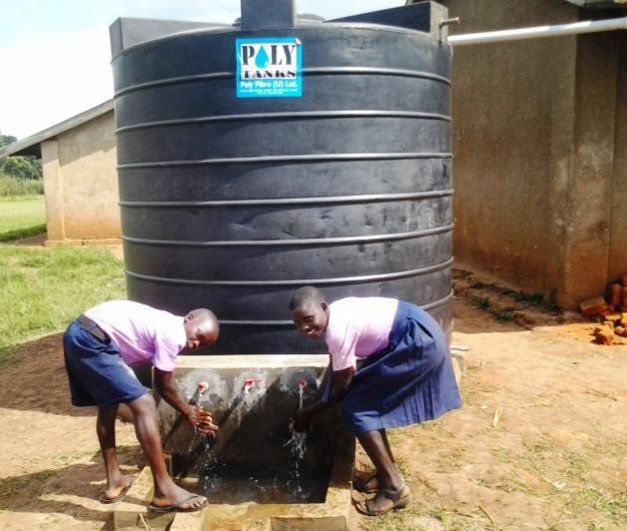 ‘Since I was in kindergarten in the little red schoolhouse in coastal Rhode Island, I have received handwashing messages in many forms – upbeat songs, large placards near sinks, and stern warnings from parents and grandparents. Flash forward to today, with repeated handwashing messages to prevent the further spread of COVID-19 reinforcing in my mind the fundamental links between personal hygiene, human health and clean water.
‘Since I was in kindergarten in the little red schoolhouse in coastal Rhode Island, I have received handwashing messages in many forms – upbeat songs, large placards near sinks, and stern warnings from parents and grandparents. Flash forward to today, with repeated handwashing messages to prevent the further spread of COVID-19 reinforcing in my mind the fundamental links between personal hygiene, human health and clean water.
‘Coronavirus drives home the importance of hand washing as essential for protecting human health. We take for granted that many communities around the world can’t simply turn on a tap to practice good hygiene. According the UN, 2.2 billion people lack access to safely managed drinking water services and 4.2 billion people lack safely managed sanitation services. Worldwide, two in five people do not have a basic handwashing facility with soap and water at home.
‘Conservation International (CI) works to spotlight and secure the critical benefits that nature provides to humanity. We recognize that reliable access to water, sanitation, and hygiene (WASH) is foundational to achieving our conservation mission. If communities lack WASH, how can they find the time and energy and good health required for environmental stewardship?
‘Since 2010, at CI we have been pushing ourselves and peers in the conservation and human development sectors to connect WASH and watershed conservation. We are driven by a theory of change in which watershed conservation and WASH efforts not only reinforce each other, but their sustained success hinges on their mutual dependence.
‘CI is moving from theory to action through engagement with individual community members up through district and national planners and policymakers.
‘As its name suggests, our WASH in Watersheds (WiW) program integrates WASH and watershed conservation, with a focus on how CI can engage local communities as land and water stewards and achieve more effective and long-lasting conservation and health and well-being outcomes as a result.
CI efforts to date include:
- Promoting more cross-sectoral planning at community and watershed scales: With support from the US Agency for International Development-funded Africa Biodiversity Collaborative Group (ABCG), CI answered the call for improved integrated programming with guidelines. We have built effective and practical field-level experiences through tested approaches in South Africa and shared lessons learned with our colleagues at the Jane Goodall Institute, who are promoting improved WASH and conservation measures in the Albertine Rift in Uganda. CI leads the ABCG working group on freshwater conservation and WASH.
- Proving the WiW theory of change in critical watersheds and water-scarce areas: Since 2011, Conservation South Africa (CSA), the local in-country affiliate of CI, has implemented the WiW framework in the Eastern Cape’s upper uMzimvubu River Basin, to improve water resource sustainability and climate change resilience. One of the main lessons learned from this work is that WASH activities create incentives and co-benefits for conservation in communities. The initiative included a gender analysis report identifying the different ways in which men and women community members should be engaged around sanitation and hygiene activities.
- Advocating for improved policy at municipal and district levels: CI and CSA are designing a roadmap for advocacy in the Mzimvubu basin. Building on existing relationships in this landscape, CSA is influencing key stakeholders and local government in adopting best practices and in developing appropriate policies. Together with fellow ABCG member The Jane Goodall Institute and WASH partner IRC, CSA is demonstrating how local-level policy mechanisms can lead to replicable models for scale-up of integrated freshwater conservation and WASH programming.
- Highlighting the ABCG Community of Practice recommendations to examine threats to freshwater conservation in Africa: On February 25, 2020, the Kenya Water and Sanitation Civil Society Network (KEWASNET) and ABCG hosted a dialogue called, “Rapid Urbanization, Infrastructure Development, and Water Conservation in Kenya,” in Nairobi, Kenya. Participants from the public, private and civil society sectors, as well as university students, called on African policymakers to prioritize freshwater conservation as a top development priority in national and regional plans.
‘Over the coming months, CI and partners will be expanding our WiW work to include lessons learned and best practices in more of our in-country demonstration sites, creating tools for engaging all levels of government to adopt an integrated view of water resources, and examining the human health aspects of handwashing and good hygiene as a fundamental component watershed conservation.
‘When I was little, I never imagined how much handwashing would play a role in my work. CI is committed to fostering approaches that meet basic human needs as enabling factors for ecosystem and human health. On this World Water Day, we look for opportunities like this to come together to care for nature and ourselves.
Read the original article by Janet Edmond, WASH and Watershed Conservation go hand in hand, published in the IUCN Commission on Environmental, Economic and Social Policy News, Mar 22, 2020.
About the author
Janet Edmond is Senior Director, Inclusive Partnerships for Sustainable Conservation, at Conservation International (CI). She has worked on the social components of conservation and human well-being, including helping to build CI’s rights-based approach. Janet works to foster effective partnerships with health and development NGOs, promote transparent and transformative stakeholder engagement and address conflict in environmental management. She has more than 25 years of experience in development and conservation, with a focus on linking human health and ecosystem health. Janet is also ABCG’s Steering Committee member from CI.
Photo description: Students at Karongo Primary school washing their hands at the newly installed water tank at their school. Photo credit: JGI


https://ofmodelsleaks.net/
https://ozempichealth.net/ | Ozempic Health Blog